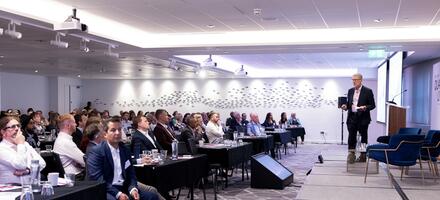
The quality career path of Emerging Talent winner 2019
Progress indicator

In this interview we speak to Victoria Derbyshire CQP MCQI, 2019 winner of the Emerging Talent category at the CQI’s International Quality Awards and now a member of the CQI’s Board of Trustees.
What was your journey into the quality profession?
When I was leaving school, I had absolutely no idea what I wanted to do; I just knew that I wanted an apprenticeship and to start working as quickly as possible. I couldn’t find an apprenticeship so I went to college while looking. After a particularly difficult day at college, I came across a quality apprenticeship at Nuvia. I didn’t know much about quality at the time but the job description appealed, so I applied. Three months later I dropped out of college and started as an Apprentice Quality Professional. I have never looked back.
What do you think the impact of your win has been on your career?
Winning is one of my proudest achievements in my career; it has enabled me to expand my network and has opened a lot of new opportunities for me. Since, I have progressed to a management role within a new organisation and have mobilised my own, small, quality team. I have also been mentoring new quality professionals and advising business leaders on how they can implement quality apprenticeship and graduate schemes. My journey into the profession was unique in that I chose it straight from education and I want to make that an option for as many people as possible.
How do you think that the quality profession can better sell quality as a career, particularly for younger people?
The first step is to make quality an option for people leaving education. We can sell quality as a career and there are plenty of roles available but very few that a school or university leaver could pursue. If organisations do not create the opportunities, there is nothing for young people to engage with. Similarly, universities do not offer degrees in quality anymore; they are only offered by a select few at Masters level, so the options for the next generation to get into quality are even more limited than they used to be.
Working with businesses and education providers to offer quality apprenticeships, courses and trainee schemes will make opportunities available to those leaving education.
What do you feel are some of the challenges facing the quality profession at present?
One of the main challenges is also a significant opportunity – the acceleration of technology capability. With the development of technology, specifically software and artificial intelligence (AI), the way organisations use humans as resources is changing, and the activities we carry out today will be very different in the future.
Deploying new and advanced technologies gives businesses access to data and information it has never had before. Organisations need this data to be analysed and used to identify failures, weaknesses in process and opportunities for improvement, which, in my opinion, the quality profession is best placed for. The challenge is to understand what the profession needs to do to become the go-to for these activities.
What do you believe are the emerging risks in your industry?
The struggle to attract the next generation. The construction industry relies on a strong, competent labour workforce, which is rapidly diminishing due to the retirement rate being higher than the hiring rate. Labouring is not an attractive role to most school leavers and it is rarely promoted as an attractive, secure, fulfilling career choice. In a post-Covid world, where working from home is accessible to most, we have experienced a steep decline in people choosing careers where they must be on site. I am concerned there will be a significant shortage once the existing workforce retires.
Another risk is associated with the increase in the use of technology. As businesses digitalise, they become more exposed to cyber-attack and the number of cyber-attacks is increasing.
The final emerging risk is that, through globalisation, the supply chain network is increasing. One of my main concerns is the potential supply and use of counterfeit items. It is becoming increasingly difficult to trace items back to where they originated and determine whether they are counterfeit. This is combatted through selectively sourcing from the supply chain and maintaining appropriate oversight of supplier activities, where the supply chain network is known to be genuine and traceability records can be provided.
"The perception of the industry needs to change to become more attractive. This is down to employers, employees, educators, and careers advisors to promote the benefits of working in the construction industry and engage with people from all backgrounds to help improve the diversity in the sector."
Do you have any ideas for how these could be combatted?
The perception of the industry needs to change to become more attractive and to engage with people from all backgrounds. More construction companies are offering enticing early careers pathways but this should be expanded to include most site and support roles.
Protection against cyber-attacks is difficult due to its constant evolution so it is about keeping up-to-date with the latest developments in technology and security. Additionally, people are using technology remotely more often so it is important to keep people educated on the different cyber threats, the consequences and how they can protect against threats.
How are emerging technologies impacting or changing how you do things, and what are you doing to support your organisation in the implementation of new technology?
Technology has become the main portion of my role over the last couple of years. One of my main responsibilities is delivering digital transformation. Last year, I focused on digitalising our site processes, introducing live data capture at the workface. I learned data analysis tools and software such as Power BI to process this data and present it in a format for the wider business to interrogate. This was a significant change as my organisation had operated solely on a paper basis previously. I am continuing to pursue other areas of the business that can be digitalised and use data analysis tools to give the business access to the data it produces, which it may have struggled to access previously.
Both the ESG and EDI agendas are key focuses at present – how do you think the quality profession can assist with this work?
The quality profession is about helping organisations deliver their goals and objectives, while meeting the needs and expectations of stakeholders. Businesses are integrating the three pillars of ESG and EDI into their management systems, which is where quality professionals can provide support: interpreting requirements and applying them, facilitating process improvements and change to accommodate additional requirements, and assessing the impact and advising how organisations can align their strategies to compliment these agendas.
What are your ambitions and how do you intend to fulfil them?
Short-term – to finish my degree and to continue to develop in my role as a trustee at the CQI. Long term – to develop my skills data analytics skills to keep up with advances in technology and to support my organisation in analysing and drawing value from data. Additionally, I have been mentoring new quality professionals for some time and would like to further this by improving my advisory and mentoring skills.
What advice would you give to others who are at the start of a quality career?
Embrace, and make the most of, every opportunity. One of the main reasons I am where I am today is because I prioritised gaining experience and building my network over chasing the roles that paid the most money. My knowledge of different organisations and industries is key for me to be able to deliver in my role, which is why experience is so important.
What it's like to be a trustee?
Conversation with Victoria Derbyshire during Trustees' Week 2022
The International Quality Awards 2024
This year's awards span eight categories, celebrating the achievements of exceptional quality professionals and auditors across the globe.
Quality World

Get the latest news, interviews and features on quality in our industry leading magazine.
Become a member
Take your quality career to the next level by becoming a member of the CQI or an IRCA Certificated Auditor.


